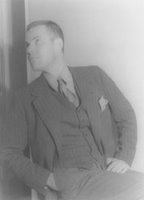 Glenway Wescott born 11 April 1901 (d. 1987)
Glenway Wescott born 11 April 1901 (d. 1987)Born on a farm in Wisconsin, Glenway Wescott has become rather overlooked as a novelist. He produced a series of best-selling, highly regarded novels, notably The Grandmothers (1927), The Pilgrim Hawk (1940) and Apartment In Athens (1945), although he didn't complete a novel after the age of forty-five. He was equally well known as an arts impressario and for the company he kept.
Wescott is a linking figure at the heart of the American literary scene in the middle of the 20th century. As a young writer in 1920s Paris, he associated with Hemingway, Gertrude Stein and F. Scott Fitzgerald. On his return to the States he was a central figure in New York's artistic and gay communities - W. H. Auden, Christopher Isherwood, Somerset Maugham, E. M. Forster, Jean Cocteau, Ford Madox Ford, Thornton Wilder, and many others were among his acquaintance.
 Although only some of his work hints at his sexuality, he wrote a private journal from 1937 until the 1950s, focusing on his private life and relationships with fellow gay artists including lifelong partner Monroe Wheeler, photographer George Platt Lynes and Paul Cadmus - this was published in 1990 as Continual Lessons. His relationship with Monroe Wheeler lasted from 1919 until Wescott's death. [Photograph of Glenway Wescott by George Platt Lynes]
Although only some of his work hints at his sexuality, he wrote a private journal from 1937 until the 1950s, focusing on his private life and relationships with fellow gay artists including lifelong partner Monroe Wheeler, photographer George Platt Lynes and Paul Cadmus - this was published in 1990 as Continual Lessons. His relationship with Monroe Wheeler lasted from 1919 until Wescott's death. [Photograph of Glenway Wescott by George Platt Lynes]In the late 1950s and early 1960s he was elected as president of the National Institute of Arts and Letters; he also assisted Dr Alfred Kinsey with his ground-breaking research into human sexuality and published a collection of critical essays on writer friends he admired, called Images of Truth (1962).
A recent biography by Jerry Rosco has brought about a fresh appraisal of Wescott's work and his central role in American literature, and his best works have begun to be republished.